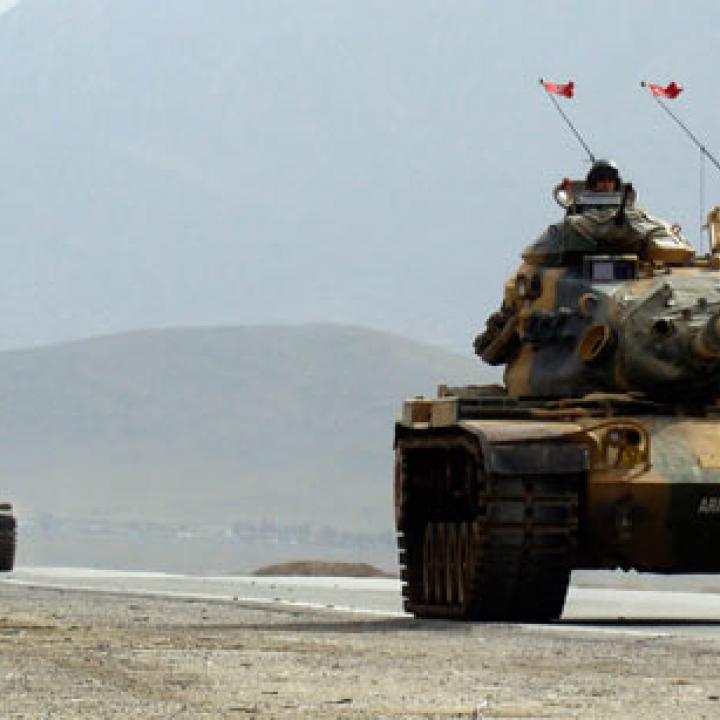

A Turkish intervention in Syria could boomerang, ratcheting up PKK attacks and eroding the soft power Turkey has painstakingly built in the Middle East over the past decade.
A visit to Gaziantep, a Turkish city near the Syrian border, suggests that Turkey's policy on Syria is evolving in parallel to Bashar al-Assad's crackdown: The more brutally al-Assad acts against its own people, the more serious Ankara's steps.
When the uprising began a year ago, Ankara initially took the more diplomatic road, suggesting that al-Assad launch political reforms and refrain from using violence when dealing with the demonstrations. Damascus, however, chose not to listen to Ankara's advice. Locals in Gaziantep who have relatives and business partners in Syria add that the regime's crackdown has only intensified over the past months.
Increasing violence against the civilian population brought Ankara to the second phase of its Syria policy -- namely taking the issue to the UN in the hopes of securing a Security Council resolution to call for an end to the regime's brutality. That effort, too, did not bear fruit: Russian and Chinese vetoes have thus far blocked UN-sponsored action to end the conflict in Syria.
Al-Assad has found encouragement in the fact that the UN Security Council will not condemn him, increasing the ferocity of his crackdown. Hence, Ankara's Syria policy, which evolves in tandem with the brutality of al-Assad's crackdown, is now moving into its next phase, building a case for delivering humanitarian assistance to the civilian population.
With the UN Security Council unable to help innocent Syrians, Ankara envisions putting the "Kosovo model" into action. In 1999, when Russia blocked a UN Security Council decision for action in Kosovo, the United States, Turkey, and other powers formed an ad hoc international coalition to end the conflict. That coalition effort succeeded.
Recently, a "Friends of Syria" initiative has coalesced, composed of countries calling for international action to end the al-Assad regime's crackdown. Ankara's next step against al-Assad is to turn to this coalition, as well as the Arab League, to lead the international community's efforts to deliver humanitarian assistance to the civilians of Syria from cities in southern Turkey.
This step may in fact succeed, bringing relief to conflict-stricken Syrians. However, it is unlikely that delivering humanitarian assistance will end the conflict. Al-Assad appears poised to continue his crackdown in the hopes of crushing the opposition. This, unfortunately, suggests even more casualties. That, in turn, begs the question of what Ankara's next step will be.
Ankara will likely not sit idly by as the al-Assad regime continues to kill fellow Muslims next door. Accordingly, Turkey's policy will become more active in the coming days. One such scenario could involve Turkey arming the Syrian opposition.
Ankara already hosts part of the Syrian opposition, including members of the civilian Syrian National Council in Istanbul and elements of the Free Syrian Army in Antakya (ancient Antioch) along the border.
While the nuts and bolts of Ankara's potential decision to arm the opposition would need to be worked out in greater detail, if such a policy also fails to convince al-Assad to stop his crackdown, Turkey would likely move to implement the next phase of its Syria policy, calling for no-fly zones inside Syria to protect civilians.
Akin to similar zones previously established in Iraq and Bosnia, such a no-fly zone would keep the al-Assad regime out of designated areas in which the civilians would come under the protection of the international community. NATO, Arab, and Turkish forces could each play different roles in protecting these safe havens. This strategy would not only protect civilians but also provide a likely counter-balance against the al-Assad regime in order to facilitate his downfall.
At the moment, however, a no-fly zone in Syria is likely Ankara's last resort. Turkey appears determined to steer clear of a full-scale military intervention to end the conflict.
Ankara believes that putting Turkish boots on the ground would make Turkey a party to the Syrian war, opening up a Pandora's Box of risky issues, such as the Kurdistan Workers Party (PKK), a group which has traditionally possessed a significant infrastructure inside Syria. Although the al-Assad regime froze all anti-Turkish PKK activity in Syria in 1999 when Ankara threatened Damascus with war, it is not far-fetched to suggest that the PKK in Syria is merely sleeping and could awaken at the sight of Turkish troops in that country.
Visiting towns in southern Turkey that have suffered from past PKK attacks, one can see this fear visibly, with the locals suggesting: "A Turkish intervention in Syria might just boomerang, ratcheting up PKK attacks."
Add to this other concerns: Turkish troops on the ground could cost Ankara dearly, eroding the soft power it has painstakingly built in the Middle East in the past decade, and it becomes nearly certain that Turkey's options in Syria are not without limits.
Soner Cagaptay is director of the Turkish Research Program at The Washington Institute.
CNN Global Public Square



